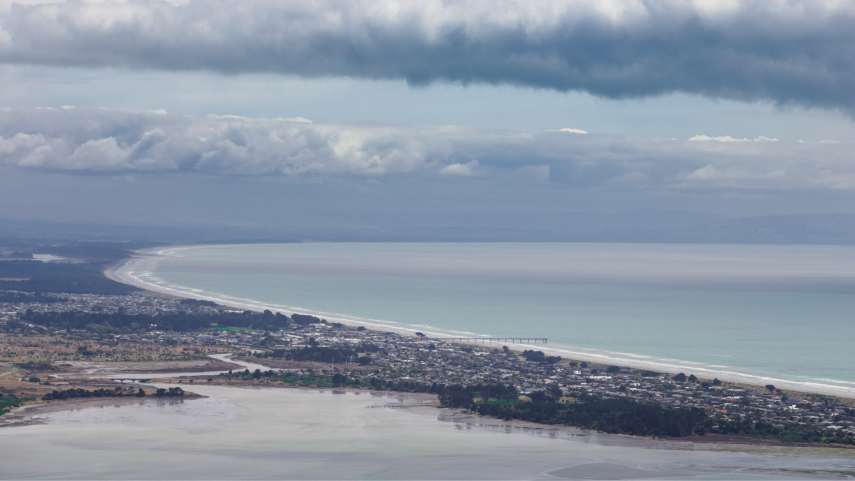Ko Te Anga Whakaora mō Ngā Arawai Rēpō
The Christchurch City Council waterways and wetlands philosophy
This guide introduces the Christchurch City Council philosophy – one that encourages people to work with natural features and processes in the landscape. Management of a waterway or wetland frequently includes its restoration and protection. Stormwater drainage is integrated with all other 'values' (ecology, landscape, recreation, heritage and culture) to form the foundation of a philosophy that is multi-disciplinary and sustainable.
The guide – often referred to as the WWDG – is out of print but the original can be viewed at the Christchurch City Libraries. We have provided an online copy in chapters below, which have been partly updated and may be viewed and downloaded.
Updated design information has been added to some chapters and the additional references identified should be treated as part of the WWDG until such time as they are incorporated into the WWDG text.
The WWDG is made up of two parts and covers:
- A multi-disciplinary approach to design and management
- Advice on-site assessment using a values-based approach
- Procedure to follow when consulting with local communities and mana whenua
- Advice on developing and implementing environmentally sensitive design
- Specific engineering and ecological criteria for the design of waterways, wetlands, stormwater pipes and other structures.
Waterways, Wetlands and Drainage Guide (WWDG)
How to use the Guide [PDF, 1.4 MB]
- Sustainable Management [PDF, 3.1 MB]. See also the Natural Asset Management Strategy [PDF, 31 MB]
- Water – An important natural resource [PDF, 12 MB]
- Making visions real [PDF, 17 MB]
- Involving the community [PDF, 5.4 MB]
- Introduction [PDF, 832 KB]
- Impacts of Development [PDF, 3 MB]
- Fish, Invertebrates, Birds and their habitats [PDF, 4 MB]
- Soils and Geomorphology of Christchurch [PDF, 1.9 MB]
- Surface Water and Groundwater Interception [PDF, 1.6 MB]
- Stormwater Treatment Systems [PDF, 8 MB] Revised 2012. See also Tree Pit [PDF, 4.5 MB]and Rain Garden Design [PDF, 6.2 MB]
- Hill Waterways [PDF, 2.7 MB]
- Lowland Waterways [PDF, 1.8 MB]
- Restoring Waterway Form [PDF, 3.5 MB]
- Restoring Wetlands [PDF, 1.9 MB]
- Riparian Planting [PDF, 1.9 MB]
- Waterway Erosion Protection [PDF, 1.5 MB]
- Waterway Structures [PDF, 3.7 MB]
- Pipeline Structures [PDF, 2.3 MB]
- Safety [PDF, 920 KB]
- Public Access [PDF, 944 KB]
- The Consent Process [PDF, 1018 KB]
- Mosquitoes and Other Insect Pests [PDF, 977 KB]
- Operation and Maintenance [PDF, 586 KB]
- Inundation Design Performance Standards [PDF, 970 KB]
- Rainfall and Runoff [PDF, 450 KB] Revised 2020. See also HIRDS V4 Design Rainfall report August 2018 [PDF, 3.5 MB]
- Hydraulics [PDF, 2.4 MB]
- Appendices [PDF, 2.9 MB] Revised
- Index [PDF, 265 KB]
- Tree Pit Design Criteria: Detailed report 15 October 2014 [PDF, 4.5 MB]
- Rain Garden Design, Construction and Maintenance Manual [PDF, 6.2 MB]
- HIRDS V4 Design Rainfall report August 2018 [PDF, 3.5 MB]
- Natural Asset Management Strategy [PDF, 31 MB]
- Comprehensive Stormwater Network Discharge Consent (CSNDC)
- Stormwater Tanks for Hill Properties [PDF, 1.3 MB]
Enquiries to the Senior Surface Water Planner or Drainage Engineer by contacting us in the Assets and Network Planning Team – phone: (03) 941 8999.
Values and visions
The values-based approach is also underpinned by the Resource Management Act (RMA), which sets out the principles for sustainably managing waterways and wetlands. These principles are given effect by the policies and rules of the Christchurch District Plan.
The RMA and the District Plan require that a wide range of impacts, benefits and community interests be considered when contemplating a treatment option for a waterway or wetland. It is therefore essential to involve and gain the support of local communities and mana whenua. A values-based approach ensures that all parties involved have opportunities to participate.
When the different values have been explored and the appropriate parties consulted, a vision can be developed. A vision may be small or large in scale; simple or complex to implement. Every site offers ample scope for flair and imagination. Wherever you see a vision realised that is based on all the values, you see sustainable management at its most creative.
Related news

Little River boil water notice lifted
The boil water notice affecting Little River’s water supply zone has been lifted.
20 Feb 2026
Boil water notice lifted
The boil water notice affecting Christchurch’s Rawhiti water supply zone has been lifted.
16 Feb 2026
Prepare for heavy rain overnight Monday
Residents are encouraged to prepare for rain predicted to impact Christchurch and Banks Peninsula from later today, with the heaviest period expected overnight from Monday to Tuesday.
16 Feb 2026